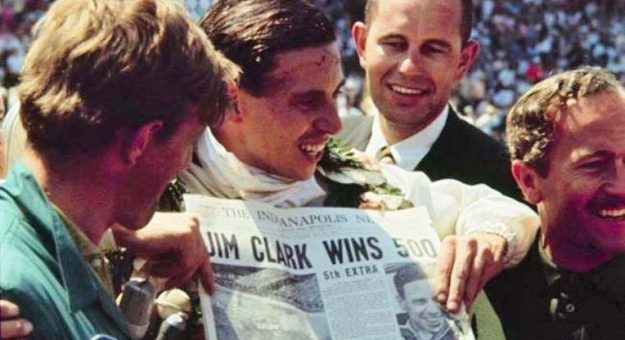Jim Clark possessed an otherworldly talent in a race car, but another passion also pulled at him — farming, of all things.
He was so enamored with it that he frequently spoke of retiring to the peaceful calm of his sheep farm in the Scottish borderlands.
That never happened. The boisterous, frenetic, perilous world of racing won out.
Clark’s first taste of motorized competition came in 1956 at local sports car events near his family’s farm. A mere six years later he was the Formula 1 world champion. Another six years and he was gone, leaving behind an indelible racing legacy.
In 72 Formula 1 starts, Clark captured 33 poles, set 28 fastest race laps and won 25 races. A phenomenal 35 percent victory rate. In 1963, he claimed his first world championship, winning seven of 10 F-1 races. In 1965, he won the Indianapolis 500 and another F-1 title.
Clark didn’t limit himself to one type of racing. He often attempted new disciplines for the challenge they offered. He won on the miles, in sports cars and hill climbs. At the urging of his friend, Fireball Roberts, he even ran some NASCAR races.
Not mechanically adept, Clark had the rare ability to force a car to do what he required. Questioned about what his car needed, he’d shrug his shoulders and tell his crew, “Don’t change anything. It’s OK the way it is.” Then he would go out and dominate his competition.
His polished driving style was easy on equipment, yet deceptively fast.
In 1967, he dominated the Italian Grand Prix at Monza before a flat tire cost him a lap. Back on the track, he pushed his car faster with each circuit. On seven consecutive laps, he set a race record. By the last lap, he’d reclaimed the lead, only to have his car run out of fuel. He limped home third.
The pivotal moment in Clark’s career was a chance meeting in 1959 with soon-to-be revolutionary car builder Colin Chapman. After they joined forces in 1960, Clark raced for few others.
Despite his tremendous success in Formula 1, it was at Indianapolis that Clark won the adulation and respect of American fans.
With Ford Motor Company’s support, Chapman launched an all-out Indy effort in 1963. At first, Clark was skeptical of Indy’s allure, but later it captured his imagination.
“To me Indianapolis is almost indescribable,” he explained. “It’s one big holiday, fair and motor race rolled into one. A national institution, with the circuit almost a shrine. I was totally unprepared for it and as it turned out, Indianapolis was totally unprepared for me.”
It certainly was.
Indianapolis stalwarts were aghast at the “foreign invasion” that rattled the status quo with rear-engine cars.
Yet, in the midst of the uproar, Clark quietly went about his business. He nearly won the 500 in his first attempt, finishing second to all-American hero Parnelli Jones in one of the more controversial finishes in Indy’s lengthy history.
The skill he demonstrated that afternoon and his graciousness in defeat, gained him immense admiration among fans and competitors alike. When he won the 1965 500, leading 190 of 200 laps, he became one of Indy’s most revered winners.
There are those who still insist Clark won the 1966 500. He was awarded second. After an inconsequential 500 in 1967, in March of 1968, Clark tested a car he believed would make him a repeat Indianapolis winner — Andy Granatelli’s new Lotus turbine.
But fate intervened. On April 7, Clark crashed during a Formula 2 race at Hockenheim. The car disintegrated around him and he died 15 minutes later.
His death stunned the world. Seemingly too good to die racing, fellow driver Chris Amon questioned, “If it can happen to him, what chance do we have?”
Clark once philosophized about death in racing, “You want to quit when someone dies. You honestly lose all interest in racing. A day later you feel a little better. Three days later you’re packing your bags for another race. You go on.”
A few days later, Clark’s saddened competitors packed their bags and went racing. The racing always goes on.
